There is a document like this one. I process 20 documents like this every day and they all look the same (structure, I mean, is very consistent).
The goal of this macro is to extract ONLY THE FIRST match of the RegEx pattern from the .ActiveDocument.Content. In the whole doc there is many more matches, but I need only the first one. The document being processed will be manually opened before the macro would run.
I'm just a VBA beginner so if there is a possibility to write it without using arrays, collections or some dictionaries I'd much appreciate. There is just one item to extract, so it's best to load it inside repNmbr string variable and from there just ws.Range("G30").Value = repNmbr. The simpler the better.
I used these resources Excel Regex Tutorial (Regular Expressions) which is very helpful but I still don't know how to load the FIRST MATCH alone into my repNmbr string variable. I'd like to do this without using any loop, because I just want to load a single string into this repNmbr variable.
Currently I have code like this:
Sub ExtractRepertor03()
'Application.ScreenUpdating = False
Dim WordApp As Word.Application
Dim WordDoc As Word.Document
Dim ExcelApp As Excel.Application
Dim rng As Word.Range
Dim ws As Worksheet
Dim regEx As Object
Dim matches As MatchCollection
Dim match As String
Dim repNmbr As String
'Assigning object variables
Set WordApp = GetObject(, "Word.Application") 'ActiveX can't create object is when
Set ExcelApp = GetObject(, "Excel.Application") 'there is no Word document open;
Set regEx = CreateObject("VBScript.RegExp")
Set WordDoc = WordApp.ActiveDocument
Set rng = WordApp.ActiveDocument.Content
'Create the regular expression object
regEx.Global = False 'because I need only the first match instead of all occurences;
regEx.IgnoreCase = True
regEx.Pattern = "([0-9]{1,5})([ ]{0,4})([/])([0-9]{4})"
'regEx.Pattern = "([0-9]{1,5})([\s]{0,4})(/[0-9]{4})"
repNmbr = regEx.Execute(rng.text) 'here is something wrong but I don't know what;
'I'm trying to assign the first RegEx match to repNmbr variable;
Debug.Print repNmbr
repNmbr = Replace(repNmbr, " ", "")
' Set matches = regEx.Execute(rng.text)
' Debug.Print regEx.Test(rng)
' 'Debug.Print regEx.Value
' For Each match In matches 'I just want this macro run without the loop
' Debug.Print match.Value 'Result: 9042 /2019
' repNmbr = match.Value
' Next match
ExcelApp.Application.Visible = True
ws.Range("G30").Value = repNmbr
End Sub
And an error like this:
Can someone explain to me why Set matches = regEx.Execute(rng.text) works fine but
repNmbr = regEx.Execute(rng.text) returns the error: "Wrong number of arguments or invalid property assignment"??
After regEx.Global = False is set, the RegEx finds only a single value, so why VBA refuses to assign this string into the repNmbr string variable??

